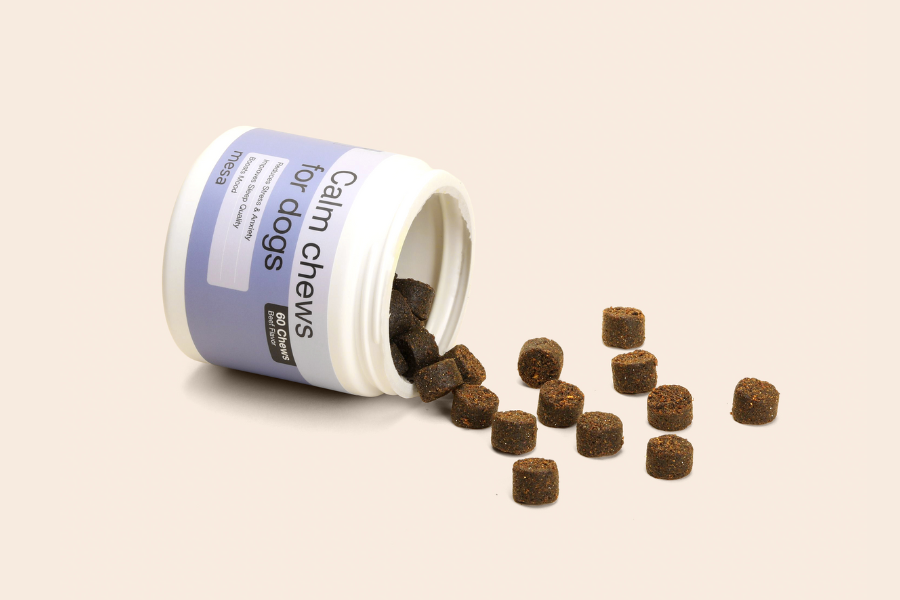For dog owners who go above and beyond to keep their furry best friends happy and healthy, discovering new ways to support their pet’s well-being is par for the course. One supplement that may catch your eye is inositol, often talked about in health circles for its benefits in humans. But can it also help dogs? And, more importantly, is it safe? If these questions have you scratching your head, don’t worry—we’ve got you covered!
This blog dives into everything you need to know about inositol for dogs. From what it is to its potential benefits (tail wags included!) and safety concerns, we’ll walk you through all the essential details.
What Is Inositol?
Before we talk puppies, let’s zoom out for a second to understand inositol itself.
Put simply, inositol is a type of sugar alcohol that plays a crucial role in the body
While often grouped with the B-vitamins, it’s not technically a vitamin—it’s more of a vitamin-like compound. It’s naturally found in foods like fruits (hello, oranges), beans, grains, and nuts. Bonus? The body can also produce it on its own.
You might think of inositol as a backstage hero. Inside the body, it’s a key player in supporting healthy cell membranes, regulating insulin, and influencing serotonin and dopamine—those feel-good neurotransmitters that keep everything zen. For humans, it’s sometimes used as a supplement to address stress, anxiety, and certain metabolic issues.
But what about our four-legged companions? What role does inositol play when it comes to dogs?

SHOP CALM CHEWS WITH INOSITOL NOW
Potential Benefits of Inositol for Dogs
When it comes to pets, inositol is starting to paw its way onto the radar, particularly for its potential benefits in managing anxiety, stress, and even skin health. While there’s limited formal research specifically geared toward dogs, there are reasons to believe this supplement could be helpful.
1. Stress Reduction and Anxiety Management
If your pup gets nervous during thunderstorms, car rides, or (gasp!) trips to the vet, inositol might offer a little relief. Studies in humans suggest that inositol can aid in managing anxiety by supporting serotonin production. While scientific studies on inositol for canine anxiety are sparse, veterinarians sometimes recommend it as part of a broader anxiety management plan for dogs.
Think of it as a gentle helper in calming an anxious dog, especially when paired with behavioral support like positive reinforcement training or calming pheromone sprays. While results may vary, it’s an appealing option for pet parents looking to avoid harsher medications.
2. Supporting Healthy Skin and Coat
Ever heard of a dog suffering from dry, flaky skin or an oily, unmanageable coat? While inositol’s role in skin health has been primarily studied in humans, the compound has properties that may benefit dogs. It’s thought to help regulate cellular function in skin and hair follicles, contributing to healthier skin and a shiny fur coat.
3. Liver Support
Dogs with certain liver conditions may also benefit from inositol supplementation. This compound has shown promise in supporting liver function by helping regulate fat metabolism. Again, while most evidence for this comes from human studies, some veterinarians have explored its use in managing liver-related issues in dogs.
4. Overall Mood and Cognitive Health
Just like humans, dogs can experience cognitive decline as they age. Early exploration suggests that inositol could help support brain health, potentially improving overall mood and cognitive sharpness, especially in senior dogs.
Is It Safe for Dogs? Key Considerations
Now for the million-dollar question—is inositol safe for dogs? Generally speaking, yes, but (and it’s a big but) only when used appropriately.
Dosage Guidelines
Getting the dosage right is crucial. For dogs, the amount of inositol needed can vary significantly depending on their size, weight, and health condition.
While there’s no universally agreed-upon standard for dogs, vets who recommend inositol often start with small doses (like 100-500 mg) and adjust based on the dog’s response. For context, much larger doses (often several grams) are sometimes used in humans, but dogs are, of course, a different story. Always consult your veterinarian before starting any supplement.
Possible Side Effects
Good news—inositol is considered low-risk and well-tolerated in most cases. However, as with anything, overdoing it isn’t a good idea. Larger doses could cause side effects like mild diarrhea, upset stomach, or lethargy. Keep an eye out for any unusual behavior or symptoms and adjust the dosage accordingly with your vet’s advice.
Contraindications (Warning Flags)
Here’s where a little extra caution comes into play. If your dog has certain underlying conditions—such as kidney disease or diabetes—it’s essential to consult your vet before introducing inositol. Why? Because inositol’s effects on insulin and glucose levels could potentially complicate things.
Additionally, if your dog is already taking medications for anxiety or liver function, ensure there aren’t any potential interactions before adding supplements into the mix.
How to Administer Inositol to Your Dog
Once you’ve got the green light from your vet, administering inositol to your dog can be a breeze.
1. Capsules or Tablets
Many inositol supplements for humans come in capsules or tablets, but you can carefully adjust the dose for your pet. Simply crush a tablet into their food for easy eating (yes, even the picky eaters).
2. Powder Form
Prefer to skip the crushing step? Many inositol supplements are available as a flavorless powder, which can be sprinkled directly onto your dog’s meal. This method works particularly well for dogs with fussy appetites because it’s seamless to mix in.
3. Dog-Specific Products
There aren’t many pet-specific inositol supplements on the market (besides ours). That doesn’t mean you can’t use the human-grade version with proper dosing. Just make sure there are no added ingredients like artificial flavors or sweeteners (we’re looking at you, xylitol!) that could harm your dog.
4. Timing
Like most supplements, consistency is key. Administering inositol with meals may help reduce the risk of tummy upset and keep supplementation a regular part of your dog’s routine.
Bringing It All Together
While the science of inositol for dogs is still emerging, there’s good reason to believe this powerful little compound can offer benefits, especially for anxiety, skin health, and even liver function. Here’s the quick take-home message for busy pet parents working overtime to keep their furry companions happy and healthy:
- What it is: A naturally occurring compound that supports cell function and can play a role in mood and overall health.
- Potential benefits: May help reduce anxiety, promote healthy skin and coat, and support liver function. Research in dogs is limited, but anecdotal evidence and veterinarian guidance provide promising insights.
- Safety first: Generally safe but requires careful dosing and veterinary input, particularly if your pup has underlying health issues.
If you’re thinking about adding inositol to your dog’s wellness toolkit, be sure to partner with your trusted veterinarian. Every pup is unique, and personalized advice is the best way to ensure you're making choices that support your furry friend’s health and happiness. Now, go give your dog a belly rub from us—they deserve it!
References
1) EFSA FEEDAP Panel (EFSA Panel on Additives and Products or Substances used in Animal Feed), 2016. Scientific opinion on the safety and efficacy of inositol as nutritional additive for dogs and cats. EFSA Journal 2016; 14(6):4511, 9 pp. doi:10.2903/j.efsa.2016.4511



